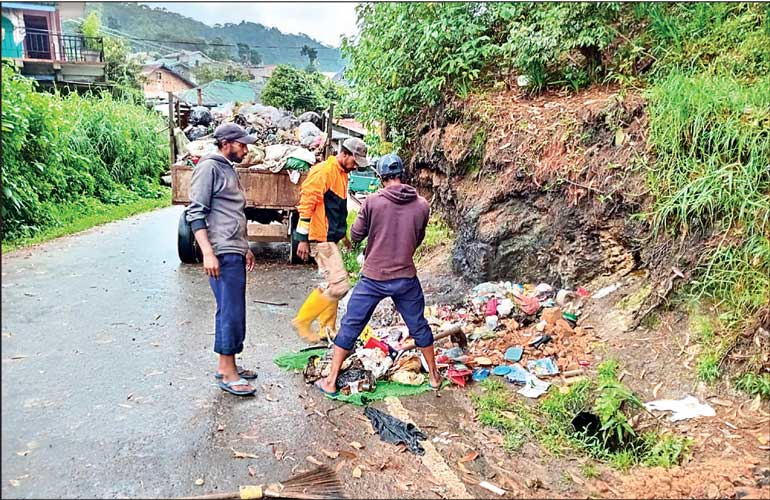Saturday Feb 21, 2026
Saturday Feb 21, 2026
Saturday, 16 November 2024 00:00 - - {{hitsCtrl.values.hits}}
 Workers clearing garbage in Nuwara Eliya
Workers clearing garbage in Nuwara Eliya
 |
 |
| Kumar | Mahendra Kumar |
By Surya Vishwa
Nuwara Eliya. The light of the mountains. Also better known as Little England, harking back to the days of colonisation when much of this part of the island was created in a model of sorts to be an idyllic home away from home for the British.
The mantle that Nuwara Eliya wears that is unique in warm Sri Lanka is its coldest effulgence and the other badges mother earth has bestowed upon it include mountains, waterfalls, tiers of agricultural slopes replete with the green headgear of orange carrots, the willowy drooping of many other diverse vegetation and the steadfast but minute strawberries, to name a few; apples and pears being the fruits this region is famous for.
Picture the winding roads, empty of hyperactive people and processions of carbon dioxide spewing vehicles. Imagine what it would be like to coolly saunter two kilometres amongst the mountains to the nearest small eatery in your house dress with a warm coat over it, not having a care about what the passers-by will think of your attire. The people of Nuwara Eliya being chiefly agriculturists are not given to petty vanity and one can get by wearing the same dress down the same road for well around 30 days if one is so comfortable with it. However, there is a catch. However beautiful may be the view across the skyline border of forests merged with mountains and however simple as well as carefree life may be, there is a scourge your eyes cannot miss. Man made tomes of trash. One cannot walk more than a few steps without kicking up plastic bags, empty biscuit packets, beer cans, plastic bottles and often anonymous sacks full of assorted refuse dumped just outside large houses, some of them which provide homestays for tourists.
Irresponsible garbage menace
This writer spent weeks photographing the irresponsible garbage menace of Nuwara Eliya which is of course the same island-wide denoting a mentality of a people that would stupefy others. Many Sri Lankans would have seen a recent video clip that went viral on social media where a young tourist was lamenting atop a salubrious mountain, at the abyss of garbage below, questioning the mentality of a human who could stoop to this sacrilege.
Among the well-run tourist establishments hosting especially backpackers is an international hostel known as Laughing Leopard. This hostel which also has a branch in Trincomalee receives daily dozens or so youth from the world over, mostly Europe. It is remarkable that this hostel follows exemplary steps in segmenting and disposing of trash so that the biodegradable is used for worthy gardening purposes and the other elements categorised so that it could be picked up easily and hygienically by the Municipal workers. However, every single day the young tourist backpackers who travel up to this hostel from the Nuwara Eliya bus stop has an inevitable eyesore in the form of an assorted array of garbage from the bus stand onwards, with the potholes filled with muddy rain water increasing the sullied look that wipes out the natural beauty of Nuwara Eliya.
In the route to this above mentioned hostel, down Uda Pussellawa road, there is a quaint eatery named Walanda and just before this premises, up to two weeks ago was a deplorable garbage dump. When this writer queried from the surrounding homes including the Walanda eatery as to who drops off this garbage, the reply was as follows: “We do not know. During rainy days the entire lot of refuse gets strewn onto the road and no one can walk on this road then. Sometimes people take these garbage filled bags and drop them off on their way to work.”
Who exactly are the culprits?
Asked why they do not keep vigil to find out who exactly are the culprits, there is silence as there is when asked why the authorities such as the public health inspector or medical officers of health or municipality staff are not contacted.
Below is the conversation carried out with the workers of the Nuwara Eliya Municipal Council as they arrived to clear this infamous mini garbage kingdom that was gathering down this road (this is just one example – walk around Nuwara Eliya and you will find duplicate versions everywhere).
“I am Mahendra Kumar. I drive this truck and everyday in different areas we collect this kind of rubbish. We carry out the collection of garbage from the homes but if it is a mountainous location we expect the householders to bring the garbage bags duly sorted into bio and non bio degradable, down to a juncture we will be stopped for sometime. We collect every week. As for non-identifiable garbage dropped off like this down road ways and canals we have the authority to locate any possible evidence such as an envelope that has an address, etc., and then proceed to take legal action.”
Asked how many such cases have been filed the Municipality workers are unable to affirm.
“Miss, just watch – in either few hours or a few days at most there will be a dozen or so garbage bags dumped right here. There was a board that we had put up stating that dumping trash here is prohibited. What is the use? Now we cannot even find that board,” states Kumar, a worker at the Nuwara Eliya Municipality whose job that keeps food on the table for his family is to keep his hometown clean. He laments that the people who dispose of the material leftovers of their daily existence/comforts/luxuries do so in a manner which does not have the remotest of consideration for the fellow human being who clears this mess.
“Some of us have boots and gloves and some don’t. We are used to the typology of mindset of Sri Lankans by now. We go home and wash ourselves clean before we engage with our children and family. In our turn we ensure that we separate the garbage properly because it is ourselves and our colleagues who clear it,” Kumar points out.
Calmly throwing garbage at bottom of waterway
In another location towards the route to the Lovers Leap waterfall, passing Gayathri Kovil and the Gayathri Mess Vegetarian Restaurant, there are continuous confetti of plastic bags, drink bottles, lunch sheets and so on and in the first waterfall one confronts on this road where there are crowded houses it is a daily practice to see women from these homes calmly throw their garbage at the bottom of the waterway.
When some youngsters from the adjoining houses were interviewed – two girls aged 16 and 24, this is what they had to say: “We have tried so many times to stop the people down this mountain throw their rubbish down this waterway. The last time we tried there was a big fight and they managed to make us seem the bad people. Every time it rains the waterways get blocked.”
This writer then proceeded to collect empty beer cans and drink bottles with the intention of speaking with the recycle promotion activists the Harmony page is connected with.
We will follow up in our next editions looking at the debilitating impact irresponsible garbage disposal has on the image of our nation and what it signifies to the world of who we are as a citizenry. We will also speak to many levels of authority including school teachers, principals, university lecturers, vice chancellors, tourist police and the police units tasked with preventing environment destruction/pollution. We have witnessed many occasions where foreign tourists walk around collecting the garbage dropped along the roads they travel on.
We believe a mass media exists for the purpose of imparting best practices to the country they serve, in addition to contributing to a well informed society, that provides all sides of a story and not just enhancing one aspect. Hence we will in our upcoming editions put out a comprehensive media research based on a set of interviews with householders in the above cited areas to find out why they throw their refuse out on the roads, alleys and canal routes. After we understand their perspective and reasons we will list out recommendations on how this situation can be rectified. We will as indicated above also focus on what responsible education could mean and what the rule of law should be. We will, in a separate segment re-visit the Meethotamulla garbage debacle of around eight years ago and find out, with case studies from Asia, what we have or not, learned since then.